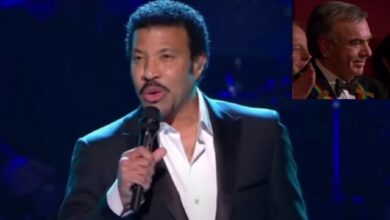Electrifying Display: Elvis Presley’s Grandson | Eager to Witness Him Live!
Benjamin Keough’s moment on The Voice was not only a significant milestone in his budding career but also served as a bridge connecting the past to the present. The performance of “Folsom Prison Blues,” a classic associated with Johnny Cash, is emblematic of the rich tapestry of American music, intricately woven with threads of country, blues, and rock ‘n’ roll. Keough stepped onto the stage with a powerful combination of confidence and charisma, drawing from his heritage while simultaneously carving out his own unique musical identity.
At 28, Benjamin embodies a blend of his family’s musical legacy and contemporary influences. Growing up in the shadow of one of the most famous entertainers in history, he has undoubtedly faced immense pressure to live up to the Presley name. However, rather than shying away from this legacy, Keough seems to embrace it, infusing his performances with the deep emotional resonance and vocal prowess reminiscent of his grandfather. This ability to channel such profound influences while crafting a sound that is distinctly his own is a testament to his artistry.
The response from the judges on The Voice encapsulates the impact that Benjamin’s performance had on both those on stage and the audience at home. Kelly Clarkson’s comparison of his voice to Elvis’s is particularly telling, as it speaks to the innate musicality that runs through the Presley lineage. Clarkson’s discerning eye for talent and her genuine excitement for Keough’s performance highlight the significance of his artistry today. It’s rare for contestants to receive such high praise, especially in a competition filled with talented singers from various backgrounds.
Blake Shelton’s appreciation of Keough’s authenticity speaks volumes about the direction in which contemporary country music is heading. In an industry often driven by commercial trends, Keough’s genuine connection to traditional sounds offers a refreshing perspective. His raw, heartfelt delivery honors the song’s roots while resonating with a modern audience, showcasing his ability to traverse multiple genres fluidly. This crossover appeal positions him as a unique contender, one who could potentially capture the hearts of fans across a variety of musical tastes.
What makes Benjamin’s journey particularly compelling is the duality of expectations and personal expression. As the grandson of Elvis Presley, he not only inherits a remarkable legacy but also carries the weight of comparison. The mix of admiration and pressure can be daunting for any artist. However, Keough’s ability to stay true to himself while paying homage to those who came before him reflects an artist who is secure in his identity. This authenticity is essential, not only for his growth within the show but for his future endeavors in the music industry.
Moreover, his performance underscored his stage presence—a crucial element for any performer. Keough engaged the audience with a mix of vulnerability and bravado, commanding the stage with an ease that belied his relatively new presence in the spotlight. His connection with the crowd and the palpable energy he created are key factors in building a fan base that extends beyond the competition. The supportive reactions and standing ovation from the audience illustrated his immediate popularity and hinted at the potential for a sustained career in music.
As viewers follow his journey on The Voice, they are likely to witness not just a competition but an evolution of an artist. Each performance is an opportunity for growth, a chance for Keough to explore different facets of his musicality. Whether he delves into heart-wrenching ballads or uplifting anthems, the anticipation surrounding his next steps will keep audiences engaged. The trajectory of his journey is uncertain, but with each note and lyric, he crafts a narrative that reflects both personal and artistic growth.
In the greater context of music, Benjamin Keough represents a new generation of artists who seek to honor their roots while pushing boundaries. His presence on a major platform like The Voice provides him with a platform to showcase not just his heritage but the broader spectrum of American music. As he navigates his career, he stands at the crossroads of nostalgia and innovation, bridging the gap between past legends and modern sounds.
Ultimately, Benjamin Keough’s performance of “Folsom Prison Blues” is not just a moment in a competition; it is a significant chapter in a larger story. The interplay of his voice, the song’s history, and the emotional weight it carries mark the beginning of what could be a remarkable journey in music. As he continues to define his path, he follows in the footsteps of his grandfather while writing his own narrative—one that promises to resonate with audiences for years to come. His role as a musician will unfold in exciting ways, and the anticipation surrounding his future performances will only continue to grow.





